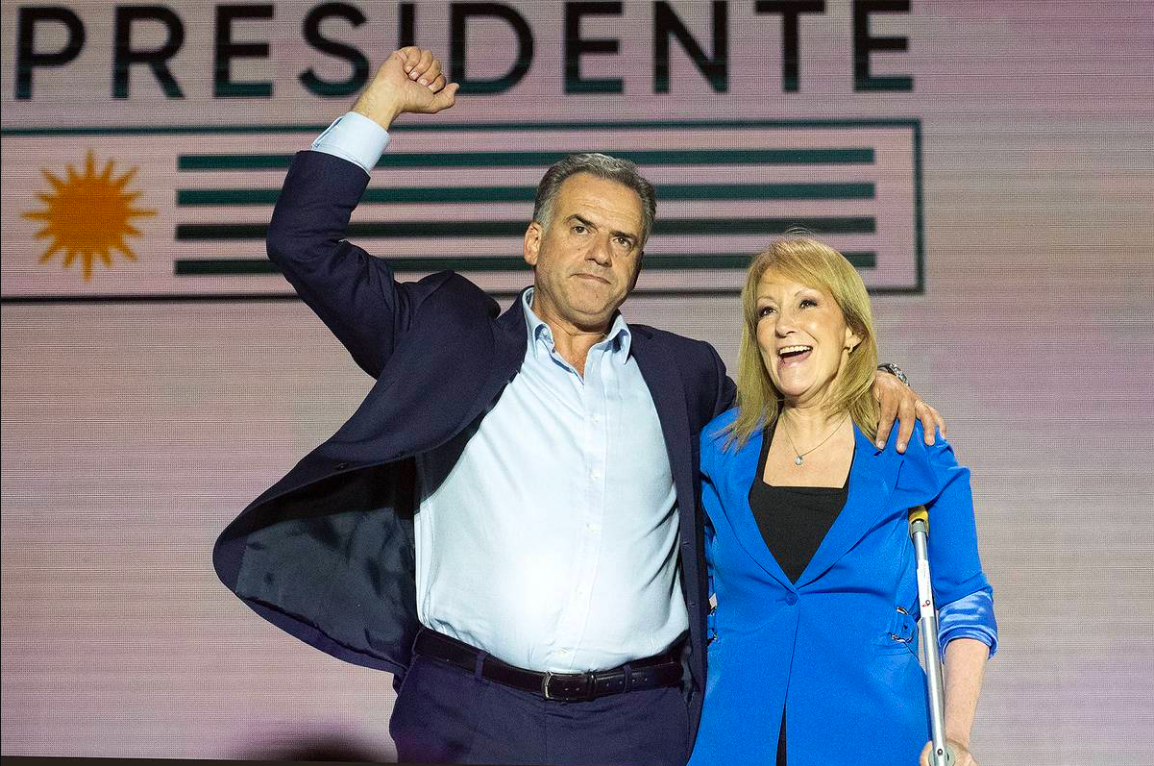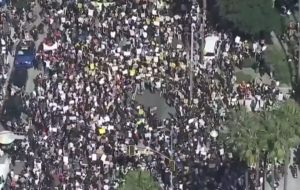
Published 10/28/2024 16:16 | Edited 10/28/2024 18:35
Uruguay experienced this Sunday (27) a decisive first round in the presidential and legislative elections, which gave the Frente Amplio (FA) the advantage, but did not guarantee victory. Candidate Yamandú Orsi obtained 43.9% of the votes, a considerable lead, but below the 50% needed to win in the first round. Orsi, who had the support of former president José “Pepe” Mujica, now faces a second round scenario, scheduled for November 24, where he will have to seek additional support to beat the ruling coalition.
The National Party, led by Álvaro Delgado, came in second place, with 26.7% of the votes, while Andrés Ojeda, from the conservative Colorado Party, reached 16%. Despite the growth of the Colorado Party, they are left out of the final dispute. Other parties, including Cabildo Abierto, received less than 5% of the vote, marking a significant decline for the nationalist right.
Compared to the last election, the FA grew from 39% to 43.8% –4.8 points–, the PN of President Lacalle Pou had a lower vote and went from 28.6% to 26.9% –1.72 points – and the Colorado Party increased its vote: it went from 12.4% of the vote in 2019 to 16.1% – a difference of 3.7 points – in these elections.
Read also: Broad Front of Uruguay “reunites with the people” and could win election on Sunday
PC of Uruguay says Frente Amplio can win, but must govern with the people
In the case of smaller parties, there were also changes in relation to the dispute five years ago: the Cabildo Abierto, a party led by Guido Manini Ríos, fell significantly and went from 11% to 2.5% of the votes – 8.5 points. The Constitutional Environmentalist Party, the Popular Assembly and the Intransigent Radical Ecologist Party voted around 0.5%, while the Party for Necessary Changes and Republican Advance voted around 0.1%.
In Montevideo, thousands of Frente Amplio voters celebrated with Orsi on the city’s coastal promenade, where he thanked them for their support and highlighted the strength of the FA, reaffirming that it is the most voted coalition in the country. At Plaza Varela, Álvaro Delgado gathered supporters of the center-right parties, highlighting the importance of unity between the coalition forces for the second round. Delgado confirmed that this Monday (28), the coalition parties will begin discussions to structure the second round campaign, also defining a common program.
Legislative composition and plebiscite reforms
In addition to the presidential dispute, members of the two legislative chambers were elected: the Chamber of Deputies, with 99 seats, and the Senate, with 30. The Broad Front won 47 seats in the Chamber, while the ruling bloc must obtain a majority with the Party Nacional, the Colorado Party, the Cabildo Abierto and the Independent Party. The news in the Chamber of Deputies is the entry of the ultra-right party that calls itself “anti-system” Sovereign Identity, which won two seats.
Voters also voted on two constitutional reform proposals: one on changes to the pension system and another to allow nighttime police raids. Both proposals were rejected, with insufficient support for approval. The pension reform, which included changes such as lowering the retirement age to 60, received just 38.8% support. The proposal on night raids had a little more, with 39.9% of the votes, but it also did not achieve what was necessary.
The elections took place peacefully, with 90% of voters participating. Since redemocratization in 1985, Uruguay has consolidated itself as one of the most stable democracies in Latin America and one of the 14 full democracies in the world, according to the The Economist. International observers were not necessary, although visitors from different countries followed the work of the Uruguayan Electoral Court.
Former president Mujica, one of the first to vote, commented on the candidates’ economic focus, lamenting the little attention given to the agricultural sector and highlighting the role of democracy. In the midst of the second round campaign, current president Luis Lacalle Pou, who headed the Senate lists for the National Party, reinforced his commitment to an orderly transition until the end of his term.
The challenge of the next government
With an economy classified as “high income” and a high Human Development Index, Uruguay faces social challenges, such as child poverty, estimated at 20%, and public security issues. Although the country has a homicide rate of 11.2 per 100,000 inhabitants — lower than that of many Latin American countries — it is still far from comparable countries, such as Chile.
With the second round approaching, the Frente Amplio will seek to intensify its support to ensure victory, while the governing coalition will try to mobilize center and right-wing voters to maintain power. With the polarization of political forces and socioeconomic challenges, Uruguay is preparing for another decisive electoral round.
Source: vermelho.org.br

